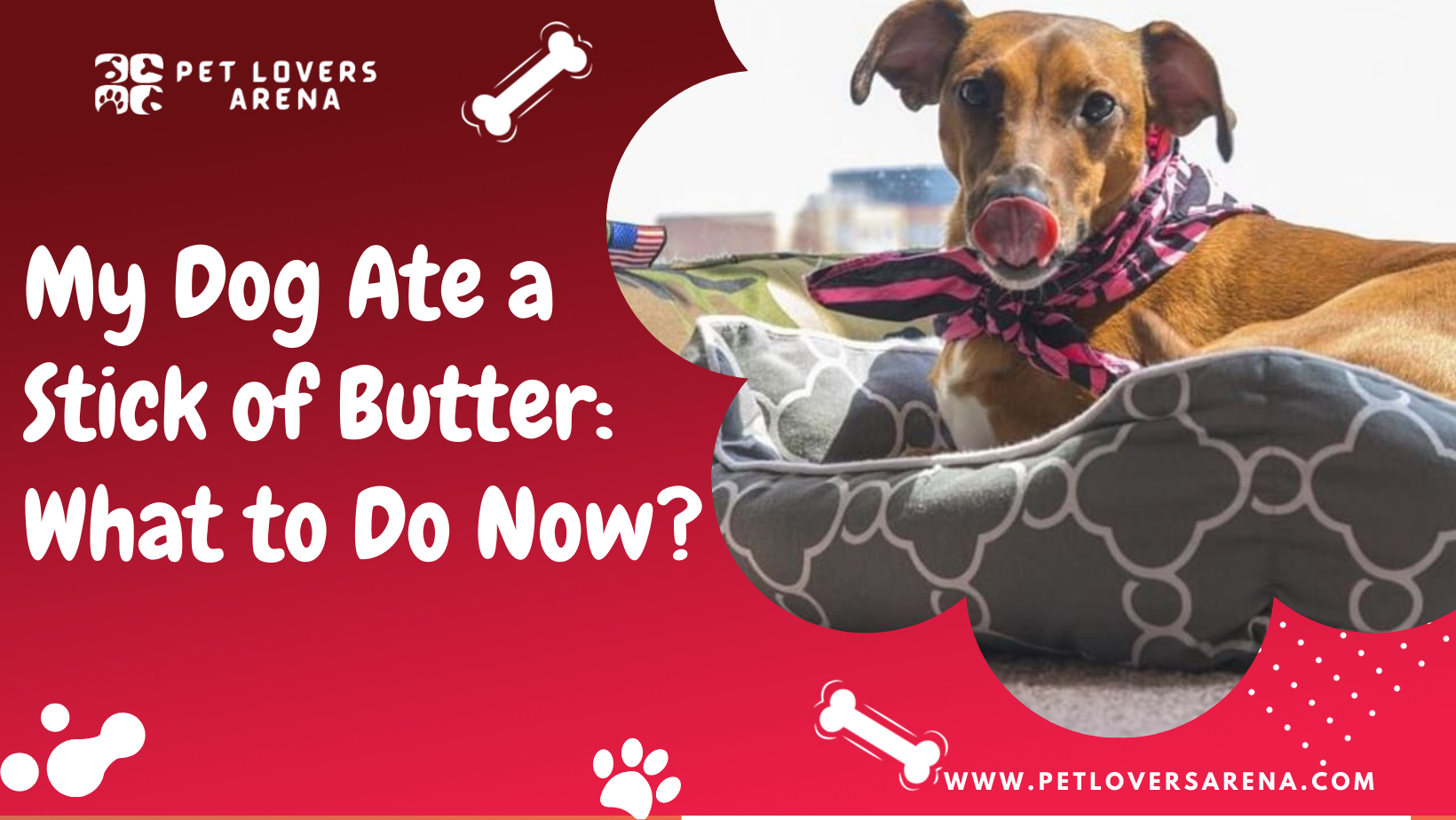Butter is a household staple that comes in various forms and is absolutely a favourite of your dog; they run to grab it and gobble it up. Butter is one such dairy product that is more likely to be stolen by your dog; however, if your dog eats too much of it, you should be concerned.
Butter is rich in fat, and having too much fat at once is not good for your dog’s health. However, fortunately for your dog, butter is not very toxic besides its high fat and lactose content. Nevertheless, this high fat and lactose level can cause your dog diarrhea and problems in the digestive system that can get cured by proper treatment.
If a dog with digestive problems, pancreatitis, or obesity eats butter, it can cause severe problems because of the increased risk for various problems; some remain untreated. Read the article below to learn more about the dangers eating butter can cause in your dog’s body.
Why Do Dogs Like Butter So Much?

Not only dogs but many other animals also like food that is rich in calories. After all, excess calories are only now being recognized as a problem, whereas they were previously considered essential.
In the past, calories were considered necessary, and high-energy foods were considered the best foods to eat. It’s usually salted, so it’s loved by dogs a lot. Dogs love butter and the things where butter gets applied especially bread. Butter is usually famous for being dogs’ favourite food for so long.
Is Butter Dangerous or Bad For Dogs?
Yes. A great amount is! Butter is not dangerous to dogs like xythiol and chocolates, which are toxic. A small amount of butter, like that of a stick of butter, can pass through the digestive system of a dog without causing it much harm.
These things don’t mean the dog won’t face any harm or trouble after eating large quantities of butter. Butter is a dairy product containing high fat and also contains lactose that can cause significant damage to your dog’s body.
In addition, a large amount of butter can cause vomiting and diarrhea in your dog, depending on your dog’s resistance to such products.
Butter or butter spread in large amounts can cause great harm to your dog’s body. But butter is edible, so this will not harm your dog as much as Vaseline or other non-edible substances.
Butter is high in calories, and there are high chances that your dog will gain weight and develop obesity after eating butter in great amounts. Obesity is the reason for numerous health problems in dogs and humans. Just like humans, dogs with obesity are more prone to diabetes and arthritis, which can cause trouble for your dog.
A large amount of lactose in your adult dog’s diet will not be healthy. Because most adult dogs are lactose intolerant, consuming large amounts of dairy products can cause diarrhea and upset stomach in your dog.
Dogs can only digest lactose or milk sugar when they are puppies, but as they grow old, they become lactose intolerant, causing diarrhea, vomiting, and other problems.
A large amount of fat is not good for the dog’s body as it may affect and damage your dog’s pancreas, causing pancreatitis in them.
Pancreatitis in dogs is a painful and life-threatening condition causing trouble for your dog. Symptoms of pancreatitis in dogs include vomiting, stomach pain, losing the will to eat, etc. Dogs who have recently chowed down or eaten a full stick of butter can be diagnosed with pancreatitis.
In addition, butter can be given in the form of toppings with other substances that can harm your dog. The butter topping on the bread in a great amount can surely cause significant harm to your dog.
Eating corn cobs can also be life-threatening to your dog. Selecting sweet corn is fine, but never let your dog eat internal cob as it can be dangerous for your dog’s life.
Can My Dog Die From Eating Butter?
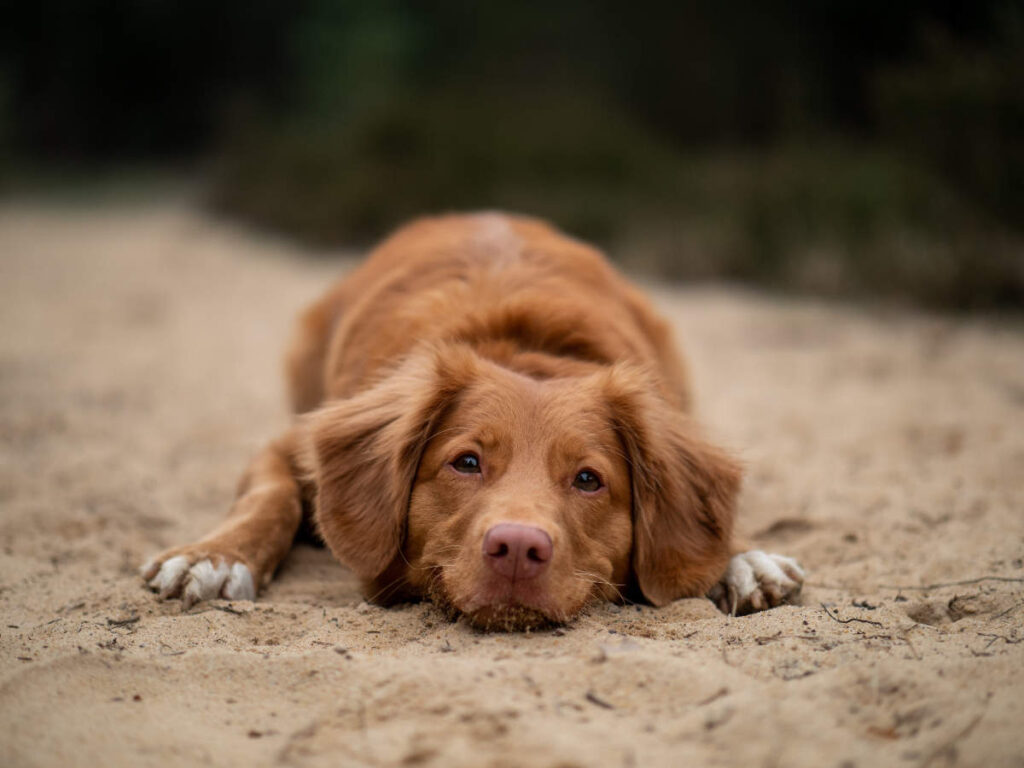
No. As butter is not toxic like grapes are to dogs, there is no chance that butter can kill your dog. If the dogs eat small to moderate amounts of butter, they will be fine and not show any rough symptoms.
The main problem arises when the dog eats a large amount of butter at one go, as it can cause severe pancreatitis in your dog, which can be fatal if not treated on time. This condition of pancreatitis is usually rare and unlikely to happen to your dog. To be safe, we advise you to contact the veterinarian if your dog ate a lot of butter.
What Is The Reaction of a Dog’s Body to Butter?
Naturally, adult dogs are lactose intolerant, meaning the dog’s digestive system doesn’t produce enough lactase to break lactose. In addition, butter is a by-product of milk, containing a great amount of lactose that is tough for dogs to digest, causing problems.
When your dog eats butter, it enters the digestive system, and the digestive system doesn’t produce enough lactase to digest the butter. So, depending upon your dog’s size, it will either immediately vomit out the butter the dog ate or pass through its body and make its way down.
If the butter remains in your dog’s body and the dog doesn’t vomit it out, there are chances that it will cause stomach cramps, bloating, and eventually diarrhea in your dog.
For a day or two, the dog is most likely to remove the butter the dog has eaten in the form of loose stools, and then the dog’s digestive system will be back on track.
In most cases in dogs, these conditions arise, but in some cases, they may become so severe that they require immediate medical attention, of which some are listed below.
1. Pancreatitis
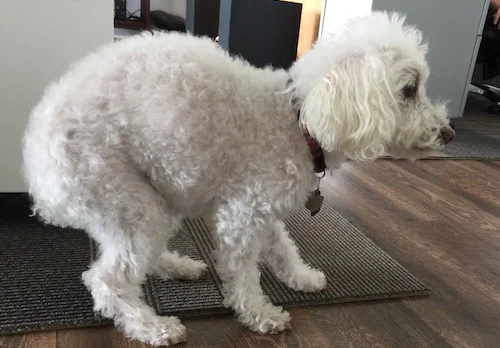
The pancreas is mainly responsible for producing important digestive enzymes and insulin in humans and dogs. Pancreatitis usually occurs when there is inflammation in the pancreas as the enzymes start digesting the organ of the pancreas itself.
Pancreatitis can occur when a dog consumes a large amount of butter in a single sitting, such as a stick of butter, for an extended period.
In mild cases, pancreatitis can be cured in 2 to 3 days, but only if the dogs receive immediate medical treatment. But if the dog has pancreatitis and isn’t taken to a veterinarian quickly, it might turn into a haemorrhagic condition of pancreatitis and can even lead to death in dogs. In addition, dogs who suffer from obesity are at a high risk of acute pancreatitis.
2. Gastroenteritis
Gastroenteritis occurs due to the entry of viruses or bacteria into the digestive system of your dog. Also, you can observe gastroenteritis in your dog if your dog consumes a few foods in significantly greater amounts, like a stick of butter.
Intestinal inflammation usually leads to inflammation of the intestine area or stomach, which results in vomiting and diarrhea in your dog. Typically, gastroenteritis lasts for a few days, and to help your dog recover quickly: you have to take care of your dog’s diet during these days of treatment.
What to Do If My Dog Ate a Stick of Butter?
If you notice your dog eating a small amount of butter, don’t panic; however, if you notice your dog eating a full stick of butter, here’s what you should do.
At first, you should not panic as it may further scare your dog. Also, shouting at your dog is not the solution to this either. But butter is not life-threatening to your dog, so such an action, if you do it, will make your dog scared and somewhat stubborn.
To begin, remove the butter from your dog and assess the amount of butter that your dog consumed. Next, try to find out the time when your dog ate the butter. When you know about the situation in detail, after assessing the situation properly, contact the veterinarian and follow the veterinarian’s advice.
Your veterinarian will advise you to take care of your dogs and keep a close eye on them. Also, the veterinarian will advise you to take proper and extra care of your dog if there is any medical history of a sensitive stomach in your dog.
Usually, you should watch out for your dog and its habits for three to four hours after consuming butter. Here are a few questions you should ask when you notice your dog has eaten a stick of butter.
1. Has Your Dog Had Regular Butter or Some Butter of Any Other Kind?
Regular butter we use in our house daily as a staple is usually made by churning milk or cream and then separating the fat globules from the same. Many brands add color or salt for taste, but the fact is that no toxic substance gets added to it, which may cause harm to the dog.
However, if your dog eats other kinds of butter that have xylitol, an artificial sweetener, it may be fatal for some canines. In those cases, you should have a phone nearby to inform the veterinarian immediately.
If your dog has cocoa butter, you need to contact the vet urgently as cocoa butter contains theobromine, which can cause hypersensitivity reactions in your digestive system and can cause seizures, tremors, and even heart attacks in dogs.
2. Was the Butter that the Dog Consumed Wrapped or Unwrapped?
When people panic after noticing their dog consumed butter, they forget to check whether the butter the dog ate was packed or unpacked. The main problem is with the packing of the butter, which can cause more harm to your dog than the butter itself will do.
The main problem with dogs consuming the wrapping of the butter is that the wrapper can get stuck inside the dog’s throat, and it can cause your dog trouble if choked. But if you notice your dog is not gasping for air or having breathing problems, you can stop panicking for some time. In addition, the butter is quite slippery, so it can help the wrapper pass through the dog’s digestive system sometimes.
However, if you have a dog of a small breed, there are chances that the butter wrapper will get stuck in the dog’s intestine, causing a blockage. Usually, eating butter leads to diarrhea in dogs, but if you don’t notice loose stools in your dog within a few hours, take your dog to the veterinarian immediately.
What Would Likely Happen if My Dog Ate a Stick of Butter?
Once you calculate what all your dog is going through, you can easily decide what you need to do and what not to do. Some dogs often face digestive difficulties, causing loose stops, while others may suffer from vomiting. Here are some tips for you to follow and avoid any problems that may follow afterward.
1. Don’t Give Your Dog Food at Night
When your dog eats a full stick of butter, its stomach and digestive system start working at maximum speed; adding more food to the stomach will worsen the situation by putting pressure on it. As a result, there can be an increase in the condition of stomach pain, diarrhea, etc., that other causes trouble for your dog.
You have to be careful not to give your dog some extra food, but you can surely give it some fresh water so it doesn’t become dehydrated.
2. Feed Your Dog a Bland Diet for Some Days as a Treatment
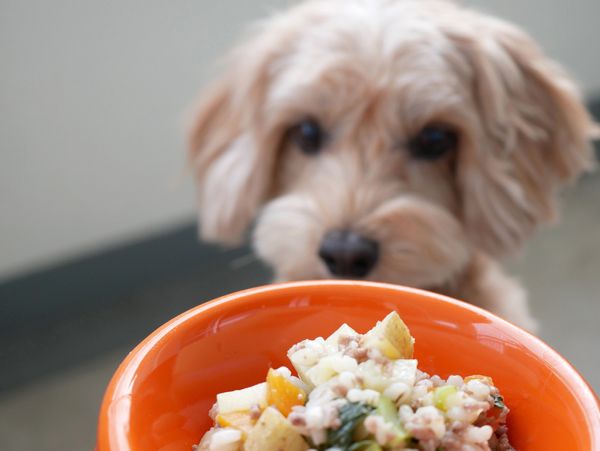
When your dog eats a stick of butter, there are high chances that your dog’s stomach will be upset for a while, and the dog will suffer from diarrhea. The vet recommends giving the dog a bland chicken and rice diet for a few days to cure diarrhea.
When your dog’s digestive system is working and processing inside the body, it is certain that the dog’s body needs food and fuel to work. But if you give some daily diet to your dog, it can worsen the situation, and your dog will face difficulty, so giving a bland diet for a few days is the best option.
You can give your dog one bowl of bland chicken and rice diet in the morning and see if your dog’s condition improves. If it doesn’t improve, have one in the evening or mix it with some dry kibble, repeat the process until the dog returns to a normal state, and you can turn the diet back to a normal regular diet after the dog recovers.
Keep Your Dog in an Enclosed Place
The butter your dog eats can cause the dog to have loose stools frequently. You can enclose your dog in a closed or gated area to ensure there are few chances of accidents occurring.
You can place your dog in an enclosed fenced area where it is easy for you to clean the area. For example, you can add potty-training pads or newspapers on the floor to protect the area from getting dirty.
What Would The Veterinarian Do if My Dog Ate Butter?
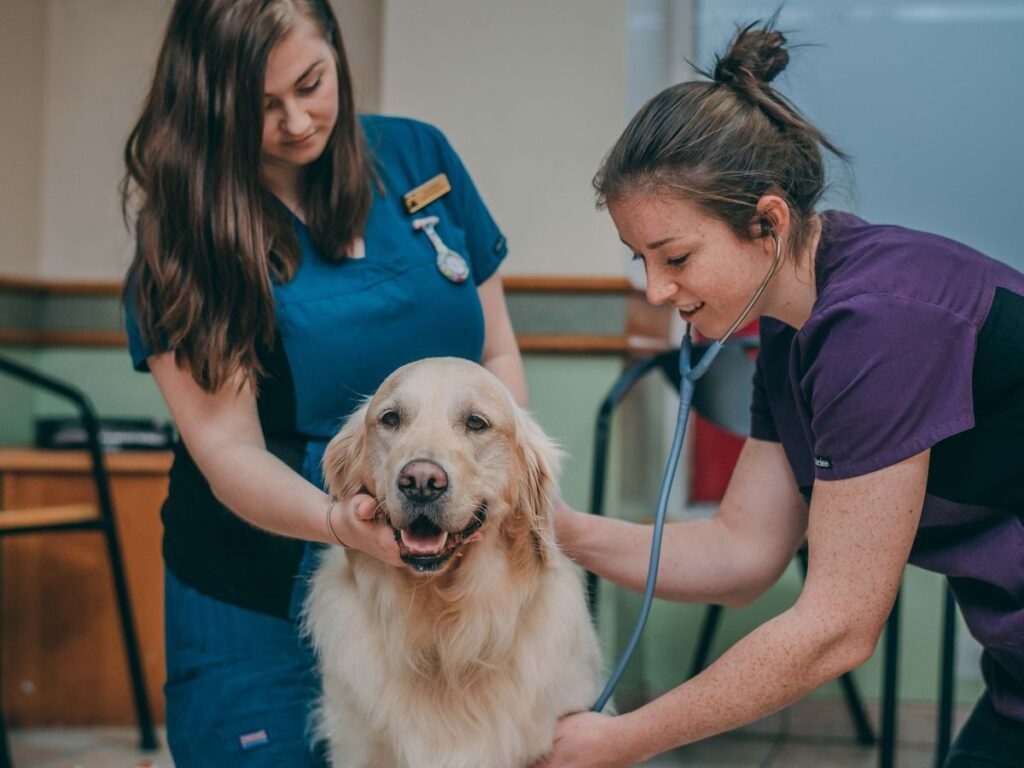
If it has only been a few hours, say four hours, since your dog has eaten the butter, then the doctor can induce vomiting by giving your dog an injection. But don’t try to induce vomiting in your dog on your own, as it may cause numerous problems and can do more harm than good.
If it has been more than a few hours since the dog has eaten the butter, then there would be no benefit to inducing vomiting in your dog. However, by this time, the butter has been in your dog’s digestive system for a long time, which can cause stomach upset.
Upset stomach in your dog can be cured within a day or two, but if your dog is more sensitive to butter or lactose, then your dog will require immediate medical assistance.
The veterinarian will perform some physical examination tests to assess your dog’s stomach pain, fever, or dehydration. For dogs with suspected pancreatitis, blood tests will be the top recommendation of the veterinarian.
In addition, dogs may need some supportive help in hospitals, including intravenous fluids, some medications to relieve pain and nausea, etc. With light medications, most dogs will make a recovery, but in a few cases, special help by doctors will be required.
Conclusion
Butter and bread are the most common staple foods used in every home that your dog can easily access. Butters are not typically dangerous for dogs, but since they contain lactose and most dogs are lactose intolerant, there are high chances of dogs having upset stomachs, diarrhea, vomiting, etc.
Large amounts of butter can increase calorie intake in your dog’s body, causing various problems. If your dog has eaten large amounts of butter, you should go with giving your dog a bland diet of chicken and rice mainly. Also, enclose your dog in a secure place to avoid any accidents.
Finally, you can consult the veterinarian for immediate help for your dog who ate a stick of butter.
Meet Madison Phillips, your compassionate guide to pet well-being. With experience from VCA Animal Hospitals and Laxton Vet Clinics Bellaire Inc. Madison honed her skills and embraced the balance of medical expertise and compassion, through her articles, she simplifies pet care, whether you’re a newbie or an experienced pet parent.

